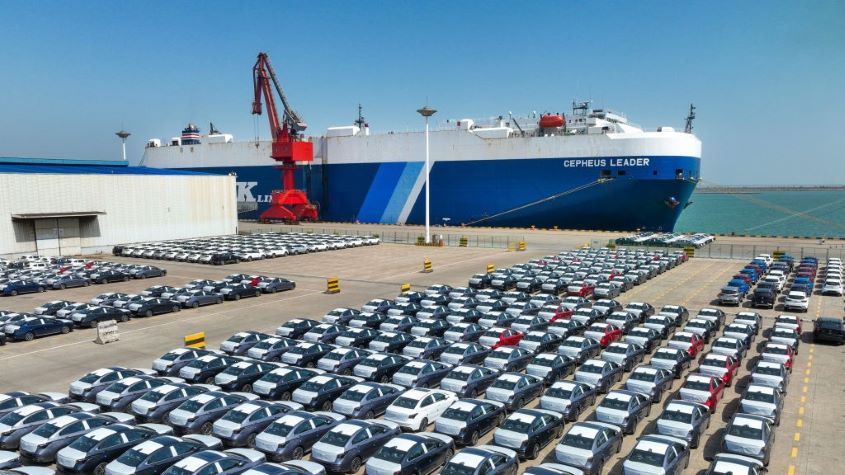GDP
Gross domestic product (GDP) is a measure of the total amount of goods and services produced by a country in a specific period of time, usually a year or a quarter.


Get the latest financial news, insights and expert analysis from our award-winning MoneyWeek team, to help you understand what really matters when it comes to your finances.
You are now subscribed
Your newsletter sign-up was successful
Want to add more newsletters?

Twice daily
MoneyWeek
Get the latest financial news, insights and expert analysis from our award-winning MoneyWeek team, to help you understand what really matters when it comes to your finances.

Four times a week
Look After My Bills
Sign up to our free money-saving newsletter, filled with the latest news and expert advice to help you find the best tips and deals for managing your bills. Start saving today!
Gross Domestic Product (GDP) is an important measure of the economic health of a country. It represents the total value of goods and services produced within a country's borders during a specific time period.
GDP is most often used for discussing individual countries, but may also be calculated for regions (eg, southeast Asia), trading blocs (eg, the European Union), or areas within a country.
GDP is used to gauge the size and growth of a country's economy, as well as its overall health. It is an essential tool for policymakers, investors, and businesses to understand the economic landscape and make informed decisions. A GDP growth indicates a strong economy, while falling GDP can signal a recession or economic downturn.
MoneyWeek
Subscribe to MoneyWeek today and get your first six magazine issues absolutely FREE

Sign up to Money Morning
Don't miss the latest investment and personal finances news, market analysis, plus money-saving tips with our free twice-daily newsletter
Don't miss the latest investment and personal finances news, market analysis, plus money-saving tips with our free twice-daily newsletter
Therefore, it is crucial to monitor GDP to ensure the stability and growth of a country's economy.
How is GDP calculated?
GDP is calculated in three ways. The production or output approach is the sum of all the value added through producing goods and providing services (ie, the market value of what’s produced minus the costs of producing it). The income approach is the sum of all the income earned by companies and individuals from offering the same goods and services. The expenditure approach is the sum of everything spent on finished goods and services. In theory, all three should produce exactly the same result, but the difficulties of collecting data means that they may not.
Expenditure is normally the most useful way to analyse what makes up GDP. The equation is GDP (represented by a Y) = consumption (C) + investment (I) + government spending (G) + exports (X) – imports (M). As the last two terms make clear, GDP is based only on what’s produced within the borders of a country. If you’re looking at how much is produced by businesses owned by residents of the country – whether production takes place at home or elsewhere in the world – the equivalent statistic is gross national product (GNP) or gross national income (GNI).
Larger countries can have a bigger GDP than smaller ones and still be poorer in terms of living standards, so we often look at GDP per capita (GDP divided by population). In addition, comparing GDP calculated at market exchange rates – known as nominal GDP – may not reflect differences in the cost of goods and services between countries. So we also look at GDP per capita at purchasing power parity (PPP), which adjusts the exchange rate to account for differences in living costs.
See Tim Bennett's video tutorial: What is GDP?
Get the latest financial news, insights and expert analysis from our award-winning MoneyWeek team, to help you understand what really matters when it comes to your finances.

Rupert is the former deputy digital editor of MoneyWeek. He's an active investor and has always been fascinated by the world of business and investing. His style has been heavily influenced by US investors Warren Buffett and Philip Carret. He is always looking for high-quality growth opportunities trading at a reasonable price, preferring cash generative businesses with strong balance sheets over blue-sky growth stocks.
Rupert has written for many UK and international publications including the Motley Fool, Gurufocus and ValueWalk, aimed at a range of readers; from the first timers to experienced high-net-worth individuals. Rupert has also founded and managed several businesses, including the New York-based hedge fund newsletter, Hidden Value Stocks. He has written over 20 ebooks and appeared as an expert commentator on the BBC World Service.
-
 Average UK house price reaches £300,000 for first time, Halifax says
Average UK house price reaches £300,000 for first time, Halifax saysWhile the average house price has topped £300k, regional disparities still remain, Halifax finds.
-
 Barings Emerging Europe trust bounces back from Russia woes
Barings Emerging Europe trust bounces back from Russia woesBarings Emerging Europe trust has added the Middle East and Africa to its mandate, delivering a strong recovery, says Max King
-
Currency risk
Glossary This is the type of risk that comes from the change in price of one currency against another...
-
 Target 2
Target 2Glossary Target is a payment system used by Europe’s central banks for urgent real-time electronic transfers.